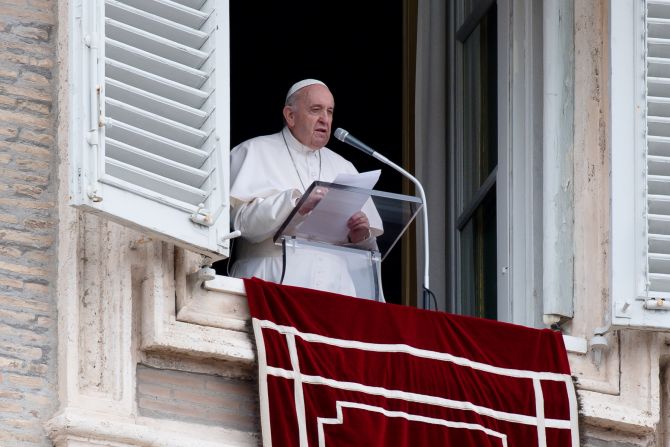To love one’s enemies and to turn the other cheek seems impossible, but Jesus Christ’s love gives Christians this strength that can save even those who hate them, Pope Francis said Sunday.
“Turning the other cheek is not the loser’s fallback, but the action of those who have greater inner strength,” the pope told crowds in St. Peter’s Square gathered for the Angelus Feb. 20.
“Turning the other cheek is to overcome evil with good, which opens a breach in the heart of the enemy, unmasking the absurdity of his hatred. And this attitude, this turning the other cheek, is not dictated by calculation or hatred, but by love.”
“Dear brothers and sisters, it is the gratuitous and undeserved love that we receive from Jesus that generates in the heart a way of acting similar to his, which rejects all revenge,” Pope Francis said.
The Pope’s remarks reflected on the Sunday gospel reading from the Gospel of Luke’s sixth chapter.
There, Jesus Christ tells his disciples: “love your enemies, do good to those who hate you, bless those who curse you, pray for those who mistreat you. To the person who strikes you on one cheek, offer the other one as well, and from the person who takes your cloak, do not withhold even your tunic.”
Pope Francis acknowledged that this can be hard.
“When we hear this, it seems that the Lord asks the impossible,” he said. “Besides, why love enemies? If you do not react to the bullies, every abuse is given the green light.”
It can be among “the most difficult situations” when we are placed before our enemies and those who “always try to harm us.”
But here, the disciple of Jesus is called “not to give in to instinct and hatred, but to go much further. Go beyond instinct, go beyond hatred,” said the pope.
He encouraged his audience to consider their “sense of injustice” at turning the other cheek, and to contrast this feeling with Jesus’ behavior in his unfair trial before the high priest during his Passion, as recounted in the Gospel of John.
At one point, when a guard slaps him in the face, Jesus does not insult the guard but responds “If I have spoken badly, show me where the evil is. But if I spoke well, why are you beating me?”
To turn the other cheek, the pope explained, does not mean “suffering in silence” or “giving in to injustice.”
“With his question Jesus denounces what is unjust. But he does it without anger, without violence, indeed with kindness. He does not want to trigger an argument, but to defuse resentment, this is important: extinguish hatred and injustice together, trying to rescue the guilty brother,” said Pope Francis.
“This is not easy, but Jesus did it and he tells us to do it too,” the pontiff said. “This is turning the other cheek: Jesus’ meekness is a stronger response than the blow he received.”
Pope Francis warned against keeping rancor in our hearts which hurts and destroys. He acknowledged that some people question whether it is possible for a person to love his or her enemies.
“If it depended only on us, it would be impossible,” he said. “But let us recall that, when the Lord asks for something, he wishes to give it. When he tells me to love my enemies, he wants to give me the capacity to do so.”
“What should we ask of him? What is God happy to give us?” the pope asked. “The strength to love, which is not a thing, but rather the Holy Spirit, and with the Spirit of Jesus, we can respond to evil with good. We can love those who do us harm. This is what Christians do. How sad it is, when people and populations proud of being Christians see others as enemies and think to wage war against each other!”
The pope encouraged Christians to think of someone who has harmed them.
“Maybe there is some resentment within us,” he said. “So, alongside this rancor we place the image of Jesus, meek, during the trial, after the slap. And then we ask the Holy Spirit to act in our hearts. Finally, let us pray for that person: pray for those who have hurt us.”
“When they have done something bad to us, we immediately go and tell others and we feel victims. Let us stop, and pray to the Lord for that person, to help him, and so this feeling of resentment disappears,” he continued. “Praying for those who have treated us badly is the first thing to transform evil into good.”
“May the Virgin Mary help us be workers of peace towards everyone, especially those who are hostile to us and do not like us,” he prayed.







